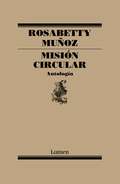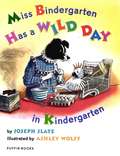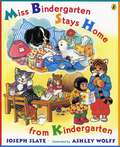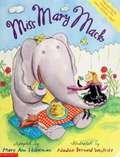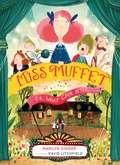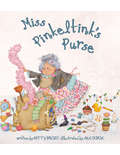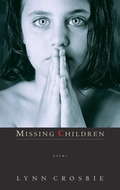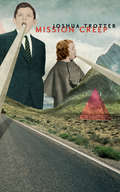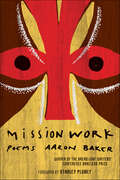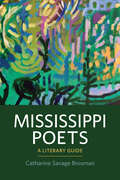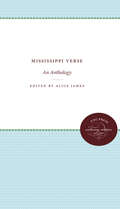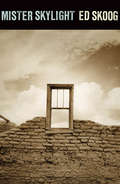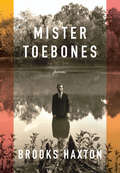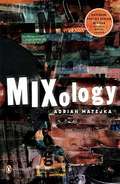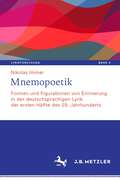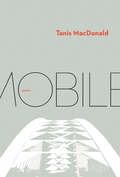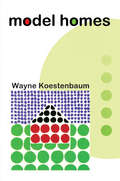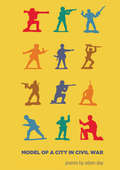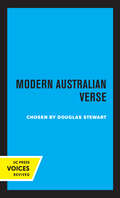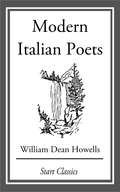- Table View
- List View
Misión circular: Antología
by Rosabetty MuñozAmplia muestra de la obra de la gran poeta chilota Rosabetty Muñoz, Premio Pablo Neruda 2000. Desde Chiloé, durante casi cuatro décadas y a través de ya diez libros, Rosabetty Muñoz ha construido una muy personal obra poética donde la naturaleza es el ámbito principal en el que otra naturaleza, la humana, se despliega con todos sus matices. Especial elocuencia tiene aquí la expresión del carácter femenino y la indagación en las realidades rurales, así como en el origen y sentido de la vida, su plenitud y desgaste, su podredumbre y fin. Misión Circular recoge lo mejor de esa obra, incluidos un libro inédito –Veteranos– y un bellísimo poema que la autora escribió a los dieciocho años y que abre esta antología a modo de arte poética. La totalidad, expuesta no cronológicamente sino en un doble movimiento del pasado al presente, permite apreciar la constancia de una voz que se caracteriza desde el principio por una llaneza intensa, un arte sugerente y perspicaz, de formas breves y desprovisto de todo ornamento.
Miss Bindergarten Has a Wild Day in Kindergarten (Miss Bindergarten Bks.)
by Joseph SlateThings are always a little rowdy in a class of twenty-six kindergartners, but there are some days when chaos reigns. Watch what happens in Miss Bindergarten's rambunctious class when water overflows, ants are on the loose, and oozy paint smudges. How will Miss Bindergarten and the kindergartners get everything back in order? This is one kindergarten adventure not to be missed!
Miss Bindergarten Stays Home From Kindergarten (Miss Bindergarten Books Ser.)
by Joseph SlateA playful take on a topic that all parents can relate to-getting sick! The ever-lovable Miss Bindergarten is not feeling well. The flu strikes on Sunday, so she has to stay home from kindergarten on Monday. Mr. Tusky (who is a wee bit rusty) will be her substitute, but it just won't be the same. The kindergartners miss Miss Bindergarten! They pass the time by making get-well cards and singing songs, all the while counting out the days that Miss Bindergarten is away. What ever will they do without her?
Miss Mary Mack: A Hand-Clapping Rhyme
by Mary Ann HobermanAn expanded adaptation of the familiar hand-clapping rhyme about a young girl and an elephant.
Miss Muffet, or What Came After
by Marilyn Singer David LitchfieldPeople will tell you that all little Miss Muffet wanted was to sit quietly and eat her curds and whey. They’ll insist that she was so scared of a spider, she ran away from it, and that’s where her story ends. Well, those people are wrong! Miss Muffet is more daring than that—and so is the spider. Together, they head off on an escapade involving a host of other nursery rhyme characters to help a famous old monarch who’s lost his fiddlers three. Told in clever verse arranged like a musical theater production, this hilarious picture book reveals the true story of the adventures of Miss Muffet and her spider friend.
Miss Pinkeltink's Purse
by Patty Brozo Ana OchoaA warm-hearted homeless woman finds a home From its humorous opening through its sad midpoint and uplifting end, Miss Pinkeltink’s story shines a light on humanity. This story with children as agents of positive change reminds us again that communities are best known by their treatment of the disadvantaged among them. "Rosy-cheeked and quite antique, Miss Pinkeltink / carried everything but the kitchen sink. / Her purse was so big that it dragged on the floor. / When she rode on the bus it got stuck in the door." Generous and eccentric, Miss Pinkeltink fills her huge purse with everything from a toilet plunger to roller skates, and then gives it all away. She offers tape to fix a flat tire and a bone to a kitty: Miss Pinkeltink’s gifts never quite hit the mark, / but she gave what she had, and she gave from the heart. And then, with nothing left to give or to shelter herself, she huddles on a park bench, trying to sleep in the rain. And that’s where Zoey sees her from her bedroom window and knows that something must be done.
Missing Children
by Lynn CrosbieA daring and innovative collection of new poems by the controversial author of Paul's Case and VillainElle.Missing Children is a daring and innovative collection of new poems by the controversial author of Paul's Case and VillainElle. Here, Lynn Crosbie creates a bold fusion of genres by taking traditional elements of the novel - dialogue, plot, and description - and weaving them through a series of narratively linked poems. Centering on a man and a woman obsessively drawn to each other, Missing Children unfolds around a forbidden relationship and a series of letters, written by the protagonist, to the parents of missing children. Infused with psychological insight, rich in cultural iconography, and written in spare, clear language, Missing Children takes us to the moral fringes of society and challenges us to judge what we find. Crosbie breaks new stylistic and dramatic ground in this compelling, original collection.From the Trade Paperback edition.
Mission Creep
by Joshua TrotterA spun radio dial passing clean through poetry. A stuttering loop of Endgame recorded by Stockhausen, remixed by Kraftwerk. The chatter of minotaurs and metadata. Transmissions from far-off futures or new pasts, recordings from a recoded present topped off with a cherry. Evel Knievel, above it all, mysterious, forever taciturn. Mission Creep comes on with the inferno of apocalyptic prophecy and melts on your tongue like the last snowflake of a nuclear winter.
Mission Work: Poems
by Aaron BakerIn this prize-winning collection, a debut poet evokes his childhood as the son of missionaries in Papua New Guinea.Mission Work is an arresting collection of poems based on Aaron Baker’s experiences as a child of missionaries living among the Kuman people in the remote Chimbu Highlands of Papua New Guinea. Rich with Christian and Kuman myths and stories, the poems explore Western and tribal ways of looking at the world -- an interface of vastly different cultures and notions of spirituality, illuminated by the poet’s own struggles as he comes of age in this unique environment.The images conjured in Mission Work are viscerally stirring: native people slaughter pigs for a Chimbu wedding ceremony; a papery flight of cicadas cuts through a cloud forest; hands sting as they beat a drum made of dried snakeskin. Quieter moments are shot through with the unfamiliar as well. In “Bird of Paradise,” a father angles his son’s head toward the canopy of the jungle so the boy can catch sight of an elusive bird. Stanley Plumly, this year’s guest judge, writes, “How rare to find precision and immersion so alive in the same poetry. Aaron Baker's pressure on his language not only intensifies and elevates his memories of Papuan 'mission work,' it transforms it back into something very like his original childhood experience. Throughout this remarkably written and felt first book, the reader, like the author himself, ‘can’t tell if this is white or black magic,’ Christian, tribal, or both at once.”
Mississippi Poets: A Literary Guide
by Catharine Savage BrosmanMississippi has produced outstanding writers in numbers far out of proportion to its population. Their contributions to American literature, including poetry, rank as enormous. Mississippi Poets: A Literary Guide showcases forty-seven poets associated with the state and assesses their work with the aim of appreciating it and its place in today’s culture. In Mississippi, the importance of poetry can no longer be doubted. It partakes, as Faulkner wrote, of the broad aim of all literature: “to uplift man’s heart.” In Mississippi Poets, author Catharine Savage Brosman introduces readers to the poets themselves, stressing their versatility and diversity. She describes their subject matter and forms, their books, and particularly representative or striking poems. Of broad interest and easy to consult, this book is both a source of information and a showcase. It highlights the organic connection between poetry by Mississippians and the indigenous music genres of the region, blues and jazz. No other state has produced such abundant and impressive poetry connected to these essential American forms.Brosman profiles and assesses poets from the twentieth and twenty-first centuries. Grounds for selection include connections between the poets and the state; the excellence and abundance of their work; its critical reception; and both local and national standing. Natives of Mississippi and others who have resided here draw equal consideration. As C. Liegh McInnis observed, “You do not have to be born in Mississippi to be a Mississippi writer. . . . If what happens in Mississippi has an immediate and definite effect on your work, you are a Mississippi writer.”
Mississippi Verse: An Anthology
by Alice JamesThis volume contains poems by: Almond, Austin, Gaine, Baringer, Blundell, Brackin, Braswell, Brown, Burnett, Cameron, Champenois, Clark, Cooper, Creekmore, Faulkner, Gibson, Gladden, Graham, Hammett, Harned, Holme, Hudson, Jackson, Lee, Legg, McFarlane, McGill, Mellen, Newson, O'Donnell, Percy, Ragsdale, Reid, Soper, Starke, West, Whitehead, Wrinn, Young, and Zeller.Originally published in 1934.A UNC Press Enduring Edition -- UNC Press Enduring Editions use the latest in digital technology to make available again books from our distinguished backlist that were previously out of print. These editions are published unaltered from the original, and are presented in affordable paperback formats, bringing readers both historical and cultural value.
Mister Skylight
by Ed Skoog"Skoog's first full-length collection captures and presents the truth of the truth: our under-analyzed, overlooked, often fragile existences on earth."--Dave Jarecki"Skoog's use of language is disorientating, vivid and surprising, all the things I love about great poetry."--Nathan Moore"Ed Skoog purposefully blindfolds us, spins us around and dares us to find a target. He wants us to be unbalanced in our interaction with the work; he wants our experience to be unsettling, for the writing to 'arrive like a hostage, an ear, a finger in the mail' (from 'Party at the Dump')."--Carolee SherwoodThe Stranger writes, "Ed Skoog's poetry is so ambitious it takes my breath away.. he knows how to braid pop culture into small personal melancholies and into large generosities."X. J. Kennedy writes, "This is the damnedest book. I love it like crazy. Skoog is a dazzling new talent who not only promises, but achieves."The phrase "Mister Skylight" is an emergency signal to alert a ship's crew, but not its passengers, of an emergency. This debut collection is alert to disasters--the flooding of New Orleans and the wildfires of California--and also to the hope of rescue. Interior dramas of the self are played out in a clash of poetic traditions, exuberant imagery, and wild metaphor.Ed Skoog, who worked for years in the basement of a museum in New Orleans, developed personal connections to objects and paintings. "Working on an exhibition about the building trades was important to this book," he writes. "Spending weeks listening to the oral histories of plasterers, steeplejacks, and carpenters connected me to my own family's stories." Marked by uncommonly intense and considered use of language, Skoog demonstrates a rich attention to form and allusive narrative as he attends to the details of contemporary politics, culture, place, and relationships.. . . Not to be the one who left is to live in an alarm.The unstraightened bed.But don't I always bring bright souvenirs from our travels,a feather, a coin, a bee? Astonishing in my palm.Minutes past your touch, what our bodies wereis disappearing like a ship caught in polar ice.Ed Skoog was born in Topeka, Kansas, in 1971. He earned degrees from Kansas State University and the University of Montana. His poems have been published in many magazines, including Poetry, American Poetry Review, and The Paris Review. He lives in Seattle.
Mister Toebones: Poems
by Brooks HaxtonIn these marvelous pages, the award-winning poet turns a searching gaze toward the shared habitat and intertwined fates of man and animal. He looks back and forward in time, down at the soil, up at the stars, and deeply into his personal relationships.Brooks Haxton has been writing for years about the connections between human beings and the creatures we find fascinating. Mister Toebones, his new collection, draws its title from a nickname Haxton gives to a daddy longlegs he sees at his father's grave. In another poem, the poet and his mother, in search of a swimming hole, find a copperhead rearing to strike, about to birth its live young. Elsewhere, waist-deep in the Mississippi River, under the Atlantic Ocean, on the cracked ice of a frozen pond, even in outer space, the poet explores regions and forces that seem past endurance. Taking stock of threats against human survival, our own recklessness chief among them, these poems seek among visionaries and despots, scientific prodigies, murderers, and lovers what vitality may come from an alertness to all living things.
Mitti Ke Manav
by Jay Shankar TripathiThe poet has shown the state of the village Ahcalpur through his poem. The village is surrounded by hills and a river. The poet has made the villagers and farms the medium of the poem.
Mixology
by Adrian MatejkaSelected for the 2008 National Poetry Series by Kevin Young The poems in Adrian Matejka's second collection, Mixology, shapeshift through the myriad meanings of "mixing" to explore and explode ideas of race, skin politics, appropriation, and cultural identity. Whether the focus of the individual poems is musical, digital, or historical, the otherness implicit in being of more than one racial background guides Matejka's work to the inevitable conclusion that all things-no matter how disparate-are parts of the whole.
Mnemopoetik: Formen und Figurationen von Erinnerung in der deutschsprachigen Lyrik der ersten Hälfte des 19. Jahrhunderts (Lyrikforschung. Neue Arbeiten zur Theorie und Geschichte der Lyrik #4)
by Nikolas ImmerIn der ersten Hälfte des 19. Jahrhunderts avanciert die Erinnerung zu einem zentralen Gegenstand der deutschsprachigen Lyrik. Das bislang in der Forschung weitgehend marginalisierte Genre der Erinnerungslyrik wird in der vorliegenden Arbeit erstmals systematisch erschlossen. Die Untersuchung ist zum einen auf die lyrische Inszenierung von Erinnerungsakten, -orten und -objekten ausgerichtet. Zum anderen wird diskutiert, inwieweit sich insbesondere in der Geschichts-, Denkmals- und Trauerlyrik erinnerungspoetische Formationen herausbilden. Die künstlerisch anspruchsvollen und zeitreflexiven Erinnerungsgedichte August von Platens und Eduard Mörikes werden in zwei eigenständigen Fallstudien behandelt.
Mobile
by Tanis MacDonaldMobile is an uncivil feminist reboot of Dennis Lee's Civil Elegies and Other Poems; an urban lament about female citizenship and settler culpability; an homage to working and walking women in a love/hate relationship with Toronto, its rivers and creeks, its sidewalks and parks, its history, misogyny and violence. How do we, in Lee's words, see the "lives we had not lived" that "invisibly stain" the city? What are the sexual politics of occupying space in a city, in a workspace, in history? How can we name our vulnerabilities and our disasters and still find strength?Written in a slippery mix of lyric and experimental styles, Mobile is MacDonald's grouchiest book yet.
Mobile
by Tanis MacDonaldLonglisted for the 2020 Toronto Book AwardsMobile is an uncivil feminist reboot of Dennis Lee's Civil Elegies and Other Poems; an urban lament about female citizenship and settler culpability; an homage to working and walking women in a love/hate relationship with Toronto, its rivers and creeks, its sidewalks and parks, its history, misogyny and violence. How do we, in Lee's words, see the "lives we had not lived" that "invisibly stain" the city? What are the sexual politics of occupying space in a city, in a workspace, in history? How can we name our vulnerabilities and our disasters and still find strength?Written in a slippery mix of lyric and experimental styles, Mobile is MacDonald's grouchiest book yet.Praise for Tanis MacDonald:"These poems performatively perturb our complacencies: toward city, land, plant, women, and men. With her sybil voice full of sass but never lacking civility, MacDonald forages the city for women's lives and names, knocking not on heaven's door but on the tombs where our world is heading. Confronting barriers of attitude and structure that women face daily, full of sounds and verve, Mobile is a deft counterpoint to Dennis Lee's long-ago Civil Elegies. Pick up this Mobile, readers; it?s ringing and it's no robocall!" —Erín Moure"With delightfully subversive wordplay and intertextual sleight of hand, Tanis MacDonald wanders the text of the modern city, exploring its civil energies with intelligence, incision, compassion, music, ferocity and wit. A Sibyl's elegies for the civil legacies of the past, these feisty poems interrogate the mansplaining streets, finding the always-there voices and experiences of women in its architecture and shadows, curbs and enthusiasms, structures and strictures, its texts and traditions, violence and vibrance, twists and d�tournes. Go with MacDonald as she guides you through the streets of Mobile. It's a tour de force." —Gary Barwin
Model Homes (American Poets Continuum #Vol. 87)
by Wayne KoestenbaumWayne Koestenbaum knows how to drop the language in the blender of the imagination and hit frappe! The 13 ottava rima cantos in Model Homes present a neo-Freudian tale of the goings-on in the poet’s present home and various events from his childhood. Modulating a voice that is urbane and ribald, melancholic and wry, Koestenbaum puts a memorable spin on the status quo notion of domestic arrangements.Wayne Koestenbaum holds a Ph.D. in English from Princeton University. He was co-winner of the 1989 Discovery/The Nation poetry contest, has published three books of poetry and three books of prose, and writes frequently for The New York Times Magazine, The London Review of Books and other periodicals. He lives in New York, NY.
Model of a City in Civil War
by Adam DayMen carry a mattress retrieved from a dumpster past the flooded foundations of an unfinished high-rise, an old woman catches a pigeon in the folds of her dress the dead smile and rise from swimming pools or stand at attention on stamps. The landscape can't believe it's real—there is no ground beneath it, like what mirrors do. Adam Day is the recipient of fellowships from the Poetry Society of America and Kentucky Arts Council, and a PEN Emerging Writers Award. His work has appeared in Boston Review, the Kenyon Review, American Poetry Review, AGNI, the Iowa Review, and others.
Modern Australian Verse: Modern Australian Verse (Poetry in Australia)
by Douglas StewartThis title is part of UC Press's Voices Revived program, which commemorates University of California Press’s mission to seek out and cultivate the brightest minds and give them voice, reach, and impact. Drawing on a backlist dating to 1893, Voices Revived makes high-quality, peer-reviewed scholarship accessible once again using print-on-demand technology. This title was originally published in 1965.
Modern Indian Literature, An Anthology: Surveys and Poems (Volume #1)
by K. M. GeorgeModern Indian Literature an Anthology comes in three volumes and this is the first volume on surveys and poems.
Modern Indian Poetry in English
by K. Ayyappa PanikerThis anthology comprises selections from poems of some of the famous Indian poets.
Modern Italian Poets
by Jacob BlakesleyIn 1948, the poet Eugenio Montale published his Quaderno di traduzioni and created an entirely new Italian literary genre, the "translation notebook." The quaderni were the work of some of Italy's foremost poets, and their translation anthologies proved fundamental for their aesthetic and cultural development.Modern Italian Poets shows how the new genre shaped the poetic practice of the poet-translators who worked within it, including Giorgio Caproni, Giovanni Giudici, Edoardo Sanguineti, Franco Buffoni, and Nobel Prize-winner Eugenio Montale, displaying how the poet-translators used the quaderni to hone their poetic techniques, experiment with new poetic metres, and develop new theories of poetics.In addition to detailed analyses of the work of these five authors, the book covers the development of the quaderno di traduzioni and its relationship to Western theories of translation, such as those of Walter Benjamin and Benedetto Croce. In an appendix, Modern Italian Poets also provides the first complete list of all translations and quaderni di traduzioni published by more than 150 Italian poet-translators.
Modern Italian Poets: Essays and Versions
by William Dean HowellsWilliam Dean Howells (1837-1920) was an American realist author and literary critic. He wrote his first novel, Their Wedding Journey, in 1871, but his literary reputation really took off with the realist novel A Modern Instance, published in 1882, which describes the decay of a marriage. His 1885 novel The Rise of Silas Lapham is perhaps his best known, describing the rise and fall of an American entrepreneur in the paint business. His social views were also strongly reflected in the novels Annie Kilburn (1888) and A Hazard of New Fortunes (1890). While known primarily as a novelist, his short story "Editha" (1905) - included in the collection Between the Dark and the Daylight (1907) - appears in many anthologies of American literature. Howells also wrote plays, criticism, and essays about contemporary literary figures such as Ibsen, Zola, Verga, and, especially, Tolstoy, which helped establish their reputations in the United States. He also wrote critically in support of many American writers. It is perhaps in this role that he had his greatest influence.
